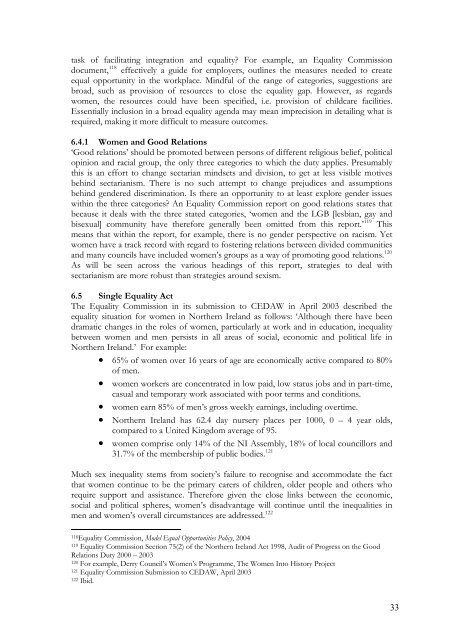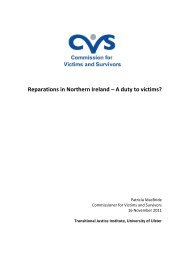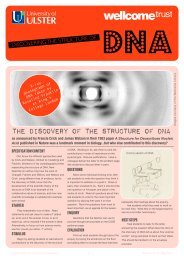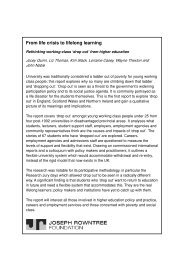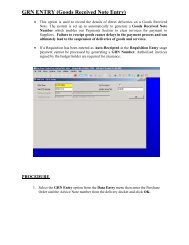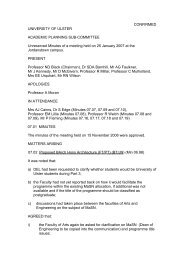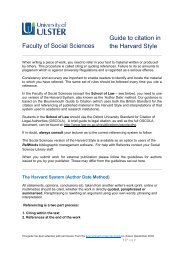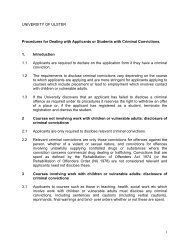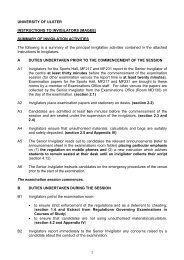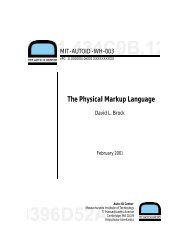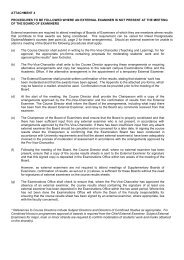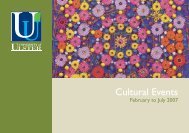Agreement Reached in the Multi-Party Negotiations - Transitional ...
Agreement Reached in the Multi-Party Negotiations - Transitional ...
Agreement Reached in the Multi-Party Negotiations - Transitional ...
You also want an ePaper? Increase the reach of your titles
YUMPU automatically turns print PDFs into web optimized ePapers that Google loves.
task of facilitat<strong>in</strong>g <strong>in</strong>tegration and equality? For example, an Equality Commission<br />
document, 118 effectively a guide for employers, outl<strong>in</strong>es <strong>the</strong> measures needed to create<br />
equal opportunity <strong>in</strong> <strong>the</strong> workplace. M<strong>in</strong>dful of <strong>the</strong> range of categories, suggestions are<br />
broad, such as provision of resources to close <strong>the</strong> equality gap. However, as regards<br />
women, <strong>the</strong> resources could have been specified, i.e. provision of childcare facilities.<br />
Essentially <strong>in</strong>clusion <strong>in</strong> a broad equality agenda may mean imprecision <strong>in</strong> detail<strong>in</strong>g what is<br />
required, mak<strong>in</strong>g it more difficult to measure outcomes.<br />
6.4.1 Women and Good Relations<br />
‘Good relations’ should be promoted between persons of different religious belief, political<br />
op<strong>in</strong>ion and racial group, <strong>the</strong> only three categories to which <strong>the</strong> duty applies. Presumably<br />
this is an effort to change sectarian m<strong>in</strong>dsets and division, to get at less visible motives<br />
beh<strong>in</strong>d sectarianism. There is no such attempt to change prejudices and assumptions<br />
beh<strong>in</strong>d gendered discrim<strong>in</strong>ation. Is <strong>the</strong>re an opportunity to at least explore gender issues<br />
with<strong>in</strong> <strong>the</strong> three categories? An Equality Commission report on good relations states that<br />
because it deals with <strong>the</strong> three stated categories, ‘women and <strong>the</strong> LGB [lesbian, gay and<br />
bisexual] community have <strong>the</strong>refore generally been omitted from this report.’ 119 This<br />
means that with<strong>in</strong> <strong>the</strong> report, for example, <strong>the</strong>re is no gender perspective on racism. Yet<br />
women have a track record with regard to foster<strong>in</strong>g relations between divided communities<br />
and many councils have <strong>in</strong>cluded women’s groups as a way of promot<strong>in</strong>g good relations. 120<br />
As will be seen across <strong>the</strong> various head<strong>in</strong>gs of this report, strategies to deal with<br />
sectarianism are more robust than strategies around sexism.<br />
6.5 S<strong>in</strong>gle Equality Act<br />
The Equality Commission <strong>in</strong> its submission to CEDAW <strong>in</strong> April 2003 described <strong>the</strong><br />
equality situation for women <strong>in</strong> Nor<strong>the</strong>rn Ireland as follows: ‘Although <strong>the</strong>re have been<br />
dramatic changes <strong>in</strong> <strong>the</strong> roles of women, particularly at work and <strong>in</strong> education, <strong>in</strong>equality<br />
between women and men persists <strong>in</strong> all areas of social, economic and political life <strong>in</strong><br />
Nor<strong>the</strong>rn Ireland.’ For example:<br />
•<br />
•<br />
•<br />
•<br />
•<br />
65% of women over 16 years of age are economically active compared to 80%<br />
of men.<br />
women workers are concentrated <strong>in</strong> low paid, low status jobs and <strong>in</strong> part-time,<br />
casual and temporary work associated with poor terms and conditions.<br />
women earn 85% of men’s gross weekly earn<strong>in</strong>gs, <strong>in</strong>clud<strong>in</strong>g overtime.<br />
Nor<strong>the</strong>rn Ireland has 62.4 day nursery places per 1000, 0 – 4 year olds,<br />
compared to a United K<strong>in</strong>gdom average of 95.<br />
women comprise only 14% of <strong>the</strong> NI Assembly, 18% of local councillors and<br />
31.7% of <strong>the</strong> membership of public bodies. 121<br />
Much sex <strong>in</strong>equality stems from society’s failure to recognise and accommodate <strong>the</strong> fact<br />
that women cont<strong>in</strong>ue to be <strong>the</strong> primary carers of children, older people and o<strong>the</strong>rs who<br />
require support and assistance. Therefore given <strong>the</strong> close l<strong>in</strong>ks between <strong>the</strong> economic,<br />
social and political spheres, women’s disadvantage will cont<strong>in</strong>ue until <strong>the</strong> <strong>in</strong>equalities <strong>in</strong><br />
men and women’s overall circumstances are addressed. 122<br />
118 Equality Commission, Model Equal Opportunities Policy, 2004<br />
119 Equality Commission Section 75(2) of <strong>the</strong> Nor<strong>the</strong>rn Ireland Act 1998, Audit of Progress on <strong>the</strong> Good<br />
Relations Duty 2000 – 2003<br />
120 For example, Derry Council’s Women’s Programme, The Women Into History Project<br />
121 Equality Commission Submission to CEDAW, April 2003<br />
122 Ibid.<br />
33


